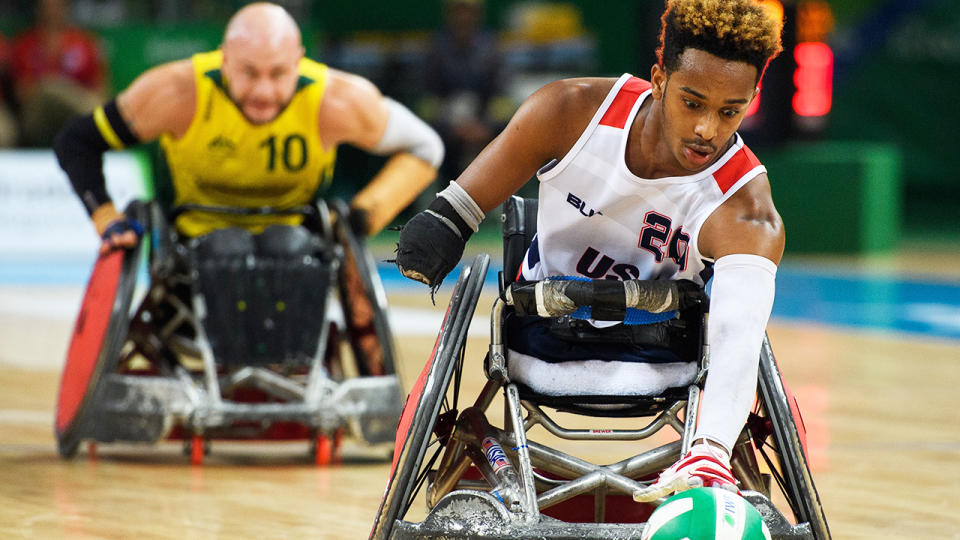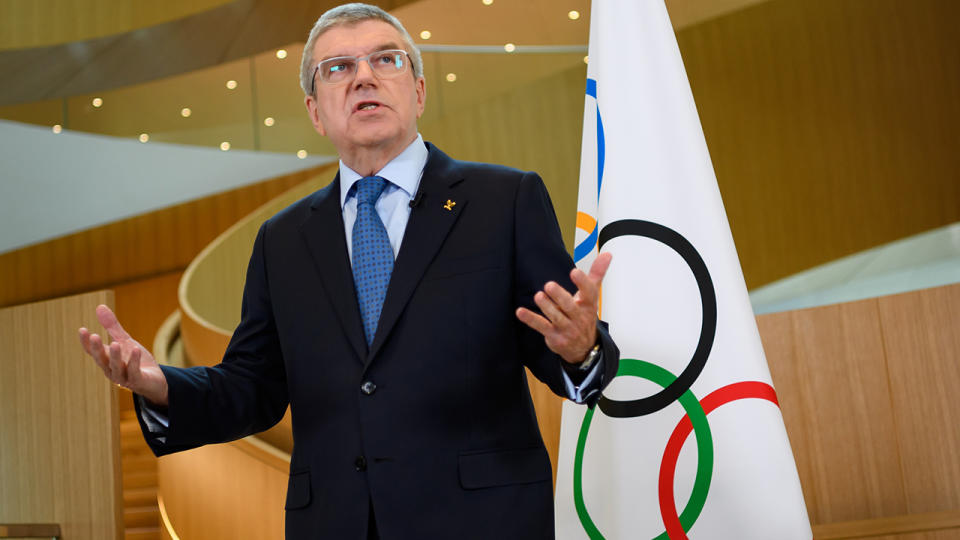Tokyo Olympics test event cancelled as $20 billion disaster looms
A wheelchair rugby test event for the Tokyo Paralympics was called off on Tuesday because of the coronavirus outbreak.
The Japan wheelchair rugby championships, which doubled as the test event, were to take place on March 12-15 in Tokyo.
‘THIS IS RACISM’: Fans kicked out of stadium over coronavirus fears
But the Japan Para Sports Association and the International Wheelchair Rugby Federation cancelled the event in line with Japan government policy discouraging large-crowd events this month in a move aimed at stemming the spread of the virus.
Tokyo Paralympics organisers said in a statement they would hold a wheelchair rugby test event in April “in some form” without any overseas teams.
Tokyo Games organisers have 17 test events remaining on their schedule. The last one is on May 8.
Most are small events featuring only local athletes. The most significant is a gymnastics test event on April 4-6 that is expected to have non-Japanese competing.

Tokyo Games organisers and the International Olympic Committee say the Games will go ahead as planned from July 24, but each passing day sees events cancelled and puts the Olympics in jeopardy.
Former IOC vice president Dick Pound told the Associated Press in an interview last week that a decision about the Olympics probably has to be made by late May.
“A lot of things have to start happening,” Pound said.
“You've got to start ramping up your security, your food, the Olympic Village, the hotels. The media folks will be in there building their studios.
“In and around that time, I'd say folks are going to have to ask: 'Is this under sufficient control that we can be confident about going to Tokyo, or not?’”
The Olympics have been cancelled only three times - all during wartime.
Kevan Gosper, who like Pound is a former IOC vice president, also said cancellation was feasible.
“For the first time we've got to think seriously that we've only got a two-to-three-month window (to decide) if we can continue with the Games,” Gosper told Australian broadcaster ABC.
“If the situation doesn't improve, or vaccines aren't available, and it continues to escalate then the only possibility is that the Games will be cancelled.”

The virus that started in China has been detected in at least 70 countries, with 90,000 cases and 3100 deaths reported.
What's at stake if Olympics fall victim to coronavirus
Concerns are swirling that Japan's dream of hosting the Olympics could be a fatality of the spread of the new coronavirus, jolting organisers, sponsors, and media firms who have spent billions of dollars in the run-up to the event.
IOC President Thomas Bach said late last month that the IOC was “fully committed” to holding the Games on schedule, and a senior Japanese official told Reuters there was no “Plan B”.
Below are the financial and economic factors at risk, with around $20 billion at stake.
OLYMPIC COSTS
Organisers said in December the Games were expected to cost some 1.35 trillion yen (about AU$19 billion), but that figure did not include an estimated three billion yen for moving the marathon and walking events from Tokyo to the northern city of Sapporo to avoid summer heat.
Tokyo 2020’s budget is split between the organising committee and local and national governments; the IOC contributed more than AU$1 billion.
Organisers say the national government will have paid some 150 billion yen – mainly for funding a new National Stadium.
Japan’s Board of Audit, however, put government spending between the bid in 2013 and 2018 at 1.06 trillion yen ($14 billion), a discrepancy organisers attributed to differences in the definition of "Games-related" spending.
SPONSORS
The Tokyo 2020 Olympics have generated record domestic sponsorship revenues of more than $4.5 billion.
That does not include partnerships with Japanese companies Toyota , Bridgestone and Panasonic, and others such as South Korea's Samsung, who through a TOP sponsors programme, have separate deals with the IOC worth hundreds of millions of dollars.

INSURANCE
Global insurers face a hefty bill if the coronavirus forces the cancellation of the Games, with estimates of the cost of insuring the showpiece running into billions of dollars.
The IOC takes out about $1.2 billion of protection for each Summer Games, which covers most of the roughly $1.5 billion investment it makes in each host city. Insurance sources estimated it would pay a premium of about 2-3%, giving a bill of up to $36 million to insure the Tokyo event.
Analysts with the financial services firm Jefferies estimate the insured cost of the 2020 Olympics at $2 billion, including TV rights and sponsorship, plus $600 million for hospitality.
MEDIA
NBCUniversal in December announced it had already sold more than $1 billion in advertising commitments in its planned US broadcasts of the Games and was on track to surpass $1.2 billion, Variety reported. The company’s parent, Comcast, agreed to pay $4.38 billion for US media rights to four Olympics from 2014 to 2020, Variety said.
Discovery Communications, the parent of television channel Eurosport, has agreed to pay 1.3 billion euros ($2.2 billion) to screen the Olympics from 2018 to 2024 across Europe.
During a recent call with investors, Gunnar Wiedenfels, Discovery’s chief financial officer, suggested a cancel led Olympics was “not going to have any adverse impact on our financials”, Variety reported, adding executives said the company had insurance to safeguard its investment.
HIT TO JAPAN'S ECONOMY
Most of the domestic spending on the Olympics has been done, so a cancellation would have minimal impact in that regard, economists said.
A Bank of Japan study in 2016 estimated Games-related spending would peak at 0.6% of gross domestic product (GDP) in 2018 and be less than 0.2% of GDP in 2020, research consultancy Capital Economics noted.
Tourism, a major contributor to recent Japanese growth, could take a hit, although economists said the greater threat was from the coronavirus spread itself.
Last year, Japan hosted 31.9 million foreign visitors, who spent nearly 4.81 trillion yen ($65 billion).
Nomura Securities had forecast consumption of 240 billion yen from event-related tourism in 2020, which it said would evaporate if the Olympics were cancel led.
Citigroup Global Markets Japan economist Kiichi Murashima said a loss of events-related tourism alone would chip 0.2 percentage points off GDP growth in the July-September quarter against the previous quarter.
But he said the chilling impact of the virus on an already struggling Japanese economy, and on global growth if the spread did not peak, meant Japan's GDP could show zero or even negative growth in the July-September quarter.
A failure to contain the global spread of the virus, would scupper a scenario that sees Japan's economy posting a V-shaped recovery after two quarters of negative growth through March, said Jesper Koll, a senior adviser at US asset manager WisdomTree.
with Reuters

